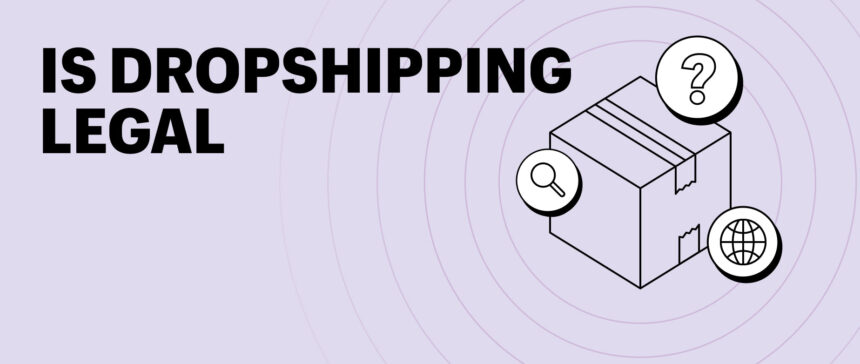Disclaimer: These guides are for informational purposes only and do not constitute professional legal advice. See the end of the article for more information.*
Starting a new business can require overhead costs like retail space and utility bills. Even small business owners who sell products online may incur expenses for storage space and shipping costs.
of Drop Shipping The business model is a legitimate and cost-effective way to run an online store and can help you avoid many of these expenses.
Here is the information you need Starting a successful dropshipping business Comply with local and national laws and regulations.
Is drop shipping legal?
Yes, dropshipping is legal. It is a widely used business model in which a retailer does not keep the products they sell in stock. When a customer places an order, the retailer forwards it to a supplier or manufacturer, who then ships the product directly to the customer. Like any business, retailers who use dropshipping must comply with local, national, and international laws regarding the sale of goods.
As long as you comply with regulations, drop shipping is available to individuals or Product Liability There are risks. We recommend that you have an attorney evaluate any legal agreements you enter into with your customers. Dropshipping Partners and Suppliers Make it clear who is legally responsible for any issues that arise during the sales process, the delivery process, and customer use.
Dropshipping Compliance
Here are some compliance issues to keep in mind when setting up a dropshipping business:
Copyright Law
A common question among new ecommerce vendors is, “Can I get sued for dropshipping?” Like any other business, you can be sued for a variety of reasons, and copyright infringement is one of them. If your supplier is selling counterfeit products to fulfill your customer’s orders, you may be violating copyright laws. Proceed with caution when partnering with suppliers and take ethical concerns seriously.
Consumer Protection Act
Even if you’re not a company that makes products, your online business can Consumer Protection Act You are responsible for the quality and safety of the goods shipped to your customers, as you may face a personal injury lawsuit if a product you sold causes personal injury. Product Liability Insurance.
Truth in Advertising Law
Dropshippers are responsible for accurately representing their products in all marketing efforts. A disgruntled customer who buys a falsely advertised product from an online store that uses dropshipping is unlikely to sue the store’s supplier. Instead, they’re more likely to sue the company whose name appears on the box.
Tax and licensing laws
Like any other retailer, dropshippers must collect and remit applicable fees. consumption tax. You also have to pay income taxIn many states, Business license If you are unsure of the licensing requirements in your area, contact a local legal professional.
What is drop shipping?
Drop Shipping A retail fulfillment method in which the retailer is responsible for sales, marketing, and customer service, while a third-party company handles manufacturing and delivery. Accomplished.
In the dropshipping business model, your store receives customer orders and forwards them to suppliers, who then pack and ship the orders.
Dropshipping is especially popular among e-commerce retailers. Start and run an online business.
Why start a dropshipping business?
Running your online store as a dropshipping business offers several advantages over the traditional retail model, allowing you to focus on certain things and leave other details to your dropshipping partner. The benefits of dropshipping include:
- Low initial cost
- No need to source materials
- No warehousing or inventory management required
- No shipping hassle
- Easily develop products and modify formulations
- Ability to focus on your areas of expertise
Low initial cost
In the dropshipping industry, you don’t have to spend money on inventorying a store, nor do you have to pay for retail space. Your main expense is purchasing products from your dropshipping supplier, which is usually done on a per-order basis after a customer order is placed. As a result, dropshippers can theoretically operate with a zero inventory budget.
No need to source materials
By partnering with a drop shipping manufacturer, you can get raw materials and supply chainThe partner will handle things like material pricing changes and delivery logistics.
No warehousing or inventory management required
Traditional retail stores require space to store inventory. Outsourcing manufacturing means Inventory controlyou can reduce these responsibilities by outsourcing order fulfillment to a dropshipping partner.
No shipping hassle
Shipping comes with many logistical challenges. Your drop shipping partner Carrier We will efficiently ship customer orders on your behalf.
Easier product development and testing
if you Private Label Drop ShippingYou can save money on product development if an outside company makes custom products for you. You can also test multiple dropshipping suppliers to see which products your customers prefer. And if your existing product isn’t working out, it’s easier to switch dropshipping suppliers than it is to develop a new product from scratch.
Ability to focus on your areas of expertise
With manufacturing and order fulfillment out of the way, you can focus on three key ecommerce elements: marketing, store design, and customer service. Your job is to do the market research and attract customers. Once shoppers find your website, you can provide them with a great buying experience. Checkout Experiencesupported by high quality customer service.
Get started with dropshipping on Shopify
Shopify users can connect their store to dropshipping suppliers to automatically import product listings and send customer orders. Learn how to get started Dropshipping with Shopify today.
*Please consult your own independent legal advisor for information specific to your country and situation. Shopify is not liable for your use of or reliance on these guides.
This post is for informational purposes only. You are responsible for verifying and using this information appropriately. This content does not contain, and is not intended to provide, legal, tax, or business advice. Requirements are frequently updated, so be sure to do your own research and consult with legal, tax, or business professionals as needed. Your state, province, or county may have different procedures and requirements. To sell products using the Shopify platform, you must comply with the laws of your business’ and your customers’ jurisdictions, the Shopify Terms of Service, the Shopify Acceptable Use Policy, and other applicable policies.
Is Dropshipping Legal? FAQ
Do I need a business license for drop shipping?
A dropshipping business is a retail business. If your state or local government requires retailers to have a license, then your dropshipping store might also need one.
What are the disadvantages of dropshipping?
The main disadvantages of drop shipping are that they usually have lower profit margins than traditional retail. The company that stores and delivers the products you sell receives a large portion of all sales. Drop shippers also have less control over the quality of the products they sell. If a drop shipping supplier causes delivery issues, the retailer is responsible for providing customer support and may receive negative reviews through no fault of their own.
What products are suitable for dropshipping?
Dropshipping is suitable for a wide range of products. These include pet supplies, phone accessories, car accessories, beauty products, apparel, coffee, cannabis products, baby products, and more. These marketplaces have a large pool of potential customers who are accustomed to buying products online and a large pool of vendors who know how to manufacture and dropship these products.
Do I need to collect sales tax on drop shipping items?
If your state or local government imposes sales tax on retail goods, then you must collect and remit that tax on products sold through drop shipping.








